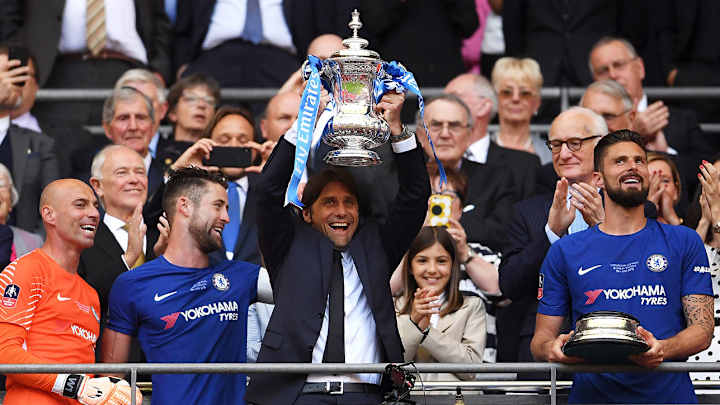FA Cup Victory a Probable Farewell Gift for Antonio Conte

Unless something extremely unlikely happens in the next couple of weeks, this was Antonio Conte's farewell from Chelsea, and he said goodbye with a win and a trophy and, perhaps more significantly for him, with success against Jose Mourinho, a manager for whom he has scarcely hidden his contempt as they have exchanged barbs all season.
For Mourinho, defeat to a first-half Eden Hazard penalty completed a season without a trophy. Perhaps circumstances off some mitigation, but for a manager who usually peaks in his second season at a club, there must be a degree of concern. Most worrying is that, yet again in a big game, United never really came close to hitting peak form. Romelu Lukaku's absence from the starting line-up with injury offered some explanation, but Marcus Rashford was again off the pace, which is bad news for Gareth Southgate, who included him in his England squad this week. It also must raise questions about Rashford¹s future; he has looked a lost soul under Mourinho.
There was talk of this as some sort of consolation final, two sides looking to redeem their seasons with the oldest silverware in professional football, but the FA Cup rarely fulfills that role. Arsenal won it in three of the previous four seasons and it did virtually nothing to quell the discontent felt towards Arsene Wenger. Or take the last eight managers to win it who weren¹t Wenger: Louis van Gaal, Roberto Martinez, Roberto Di Matteo, Roberto Mancini, Carlo Ancelotti, Guus Hiddink, Harry Redknapp, Jose Mourinho, none of them lasted a year in their jobs after success in the FA Cup final. Conte can almost certainly be added to that list.
There's no doubt that Wigan enjoyed its day at the national stadium in 2013, as Portsmouth fans did in 2008, and fans of those clubs may never have a better day in their supporting lives, but for the elite, the FA Cup barely matters. Once, when the FA Cup was the only game that was guaranteed to be televised live each season, it was an opportunity for a player to make a name for himself, to become a celebrity, now, much like the royal wedding taking place 20 miles west of Wembley in Windsor, it has become an expensive and weirdly militarized expression of a theme-park British past that ever really existed.
It feels a little distasteful to reduce what was, in the eighties, the biggest day of the English sporting year, to money, but then football long ago sold its soul to the highest bidder. The FA Cup winners (assuming they are from the top two divisions and entered the competition in the third round) take home £3,397,500 (the losers in the final £900,000 less). For coming bottom of the Premier League last season, Sunderland got £93,471,118 in prize money. Factoring in gate receipts and television revenues only add to the discrepancy. Tradition and nostalgia are all very well, but the financial imperatives are stark.
Chelsea, certainly, was in need of consolation. After winning the league so impressively last season, Conte, like so many Chelsea managers before him, failed to navigate the uniquely difficult waters of the post-championship summer. He and Mourinho have exchanged barbs all season, but the United manager knows exactly what Conte went through last summer. He too, having won the league, sought investment to challenge fully on two fronts, only to find that club policy was strict retrenchment.
Conte's squad looked slim last year and there was a widespread and surely correct perception that he would never have won the league had Chelsea also been involved in European competition. Yet this season, with Nemanja Matic and Diego Costa sold, and none of Alvaro Morata, Danny Drinkwater or Tiemoue Bakayoko have really settled, Chelsea is weaker than it was last. Victory here does not change that.
For United the prize was less consolation than reassurance. This has been a strange season for Mourinho's side, one in which it has improved by 12 points and three places on last season, yet still finished 19 points adrift of the champion, in which it has beaten every other member of the Big Six, and yet lost to all three promoted teams. History will probably judge this season on what happens next: it may turn out to have been a vital stepping-stone to glory, or it may have been merely another season of treading water in the post-Ferguson doldrums.
An FA Cup would not particularly have changed that, but it does mean the season ends on a note of failure. For Conte, meanwhile, victory was the perfect way of signing off.

An accomplished author of multiple books, Jonathan Wilson is one of the world’s preeminent minds on soccer tactics and history.